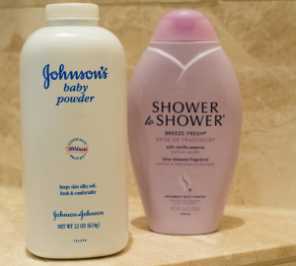Court Orders Johnson & Johnson to Pay $72M in Talcum Powder Ovarian Cancer Case
St. Louis, Missouri jury found Johnson & Johnson's talcum powder products linked to Jacqueline Fox's death from ovarian cancer at the age of 62 and awarded her family $10 million for actual damages and $62 million for punitivie damages. It is the first verdict by a U.S. jury to award damages over the claims. In October 2013, a federal jry in Sioux Falls also found that plaintiff's Deane Berg's use of Johnson & Johnson's body powder was a factor in her developing ovarian cancer but court records show no damages awarded. Valeant Pharmaceuticals International Inc now owns the Shower to Shower brand. Baby products not necessarily safe.
Many lawsuits but still no warning labels on the talcum powders:
Johnson & Johnson faces several hundred lawsuits claiming that it, in an effort to boost sales, failed for decades to warn consumers that its talc-based products could cause cancer.
Fox, who lived in Birmingham, Alabama, claimed she used Baby Powder and Shower to Shower for feminine hygiene for more than 35 years before being diagnosed three years ago with ovarian cancer. She died in October at age 62.
Jurors found Johnson & Johnson liable for fraud, negligence and conspiracy, the family's lawyers said. Deliberations lasted four hours, following a three-week trial.
Jere Beasley, a lawyer for Fox's family, said Johnson & Johnson "knew as far back as the 1980s of the risk," and yet resorted to "lying to the public, lying to the regulatory agencies." He spoke on a conference call with journalists.
Johnson & Johnson's response:
Carol Goodrich, a Johnson & Johnson spokeswoman, said: "We have no higher responsibility than the health and safety of consumers, and we are disappointed with the outcome of the trial. We sympathize with the plaintiff's family but firmly believe the safety of cosmetic talc is supported by decades of scientific evidence."
(via NBC News "Court Orders Johnson & Johnson to Pay $72M in Talcum Powder Ovarian Cancer Case")
What do the health organizations say about talcum powder and cancer?
In its natural form, some talc contains asbestos, a substance known to cause cancers in and around the lungs when inhaled (see our document Asbestos). All talcum products used in homes in the United States have been asbestos-free since the 1970s.
Most concerns about a possible link between talcum powder and cancer have been focused on:
- Whether people who have long-term exposure to natural talc fibers at work, such as talc miners, are at higher risk of lung cancer from breathing them in.
- Whether women who apply talcum powder regularly in the genital area have an increased risk of ovarian cancer.
Does talcum powder cause cancer?
When talking about whether or not talcum powder is linked to cancer, it is important to distinguish between talc that contains asbestos and talc that is asbestos-free. Talc that has asbestos is generally accepted as being able to cause cancer if it is inhaled. This type of talc is not used in modern consumer products. The evidence about asbestos-free talc, which is still widely used, is less clear.
Talcum powder may be linked to increased risk of cancer International Agency for Research on Cancer (IARC) says:
What expert agencies say
Several national and international agencies study substances in the environment to determine if they can cause cancer. (A substance that causes cancer or helps cancer grow is called a carcinogen.) The American Cancer Society looks to these organizations to evaluate the risks based on evidence from laboratory, animal, and human research studies.
The International Agency for Research on Cancer (IARC) is part of the World Health Organization (WHO). Its major goal is to identify causes of cancer.
- IARC classifies talc that contains asbestos as “carcinogenic to humans.”
- Based on the lack of data from human studies and on limited data in lab animal studies, IARC classifies inhaled talc not containing asbestos as “not classifiable as to carcinogenicity in humans.”
- Based on limited evidence from human studies of a link to ovarian cancer, IARC classifies the perineal (genital) use of talc-based body powder as “possibly carcinogenic to humans.”
The US National Toxicology Program (NTP) is formed from parts of several different government agencies, including the National Institutes of Health (NIH), the Centers for Disease Control and Prevention (CDC), and the Food and Drug Administration (FDA). The NTP has not fully reviewed talc (with or without asbestos) as a possible carcinogen.
(For more information on the classification systems used by these agencies, see our document Known and Probable Human Carcinogens.)
Alternatives?
"Until more information is available, people concerned about using talcum powder may want to avoid or limit their use of consumer products that contain it. For example, they may want to consider using cornstarch-based cosmetic products instead. There is no evidence at this time linking cornstarch powders with any form of cancer."
(via "Talcum Powder and Cancer")



 Report a concern
Report a concern

 Add Comment
Add Comment



